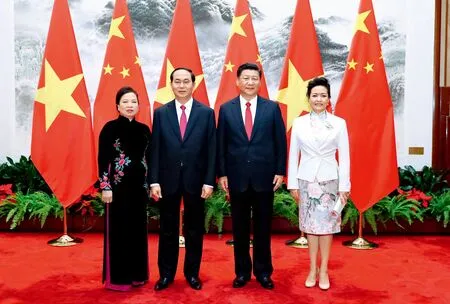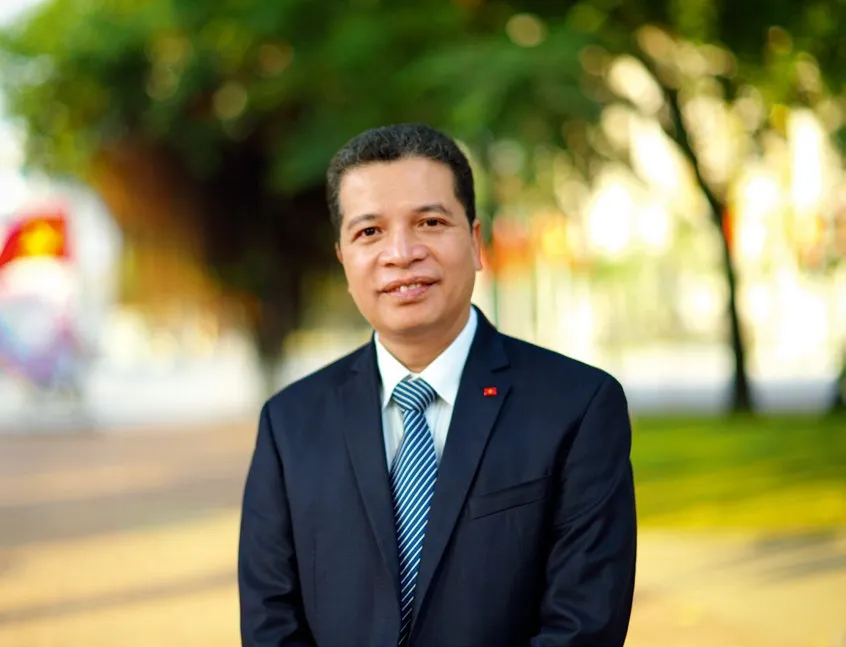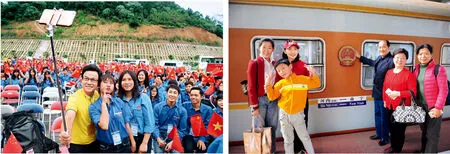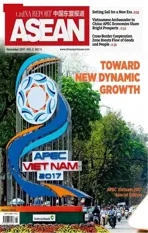DANG MINH KHOI:APEC ECONOMIES SHARE BRIGHT PROSPECTS
2017-11-22ByZhangChunxia
By Zhang Chunxia
DANG MINH KHOI:APEC ECONOMIES SHARE BRIGHT PROSPECTS
By Zhang Chunxia
Economic Leaders'Meeting in Da Nang represents an opportunity to bring China-Vietnam ties closer together, explains Vietnamese Ambassador to China

Chinese President Xi Jinping (second right) and his wife,Peng Liyuan (first right), with Vietnamese President Tran Dai Quang (second left) and his wife, Nguyen Thi Hien(first left), at a welcoming ceremony at the Great Hall of the People in Beijing on May 11, 2017.

Vietnamese Ambassador to China Dang Minh Khoi.
On Nov. 6-11, the 2017 APEC Economic Leaders' Meeting will be held in Da Nang, Vietnam,marking an important summit at which some of the world's largest and most important economies will be represented.
As the host of APEC 2017, what preparations has Vietnam made?What impact will this meeting have on Vietnam? With these questions and more in mind,China Report ASEAN sat down for an interview with Vietnamese Ambassador to China Dang Minh Khoi.
>> China Report ASEAN:Mr. Ambassador, what’s your understanding of APEC as an economic cooperation organization? What role has APEC played in promoting regional economic development?
Dang Minh Khoi:APEC's 21
member economies are home to 39 percent of the world’s population, 57 percent of the world’s economic aggregate and 49 percent of the world’s total volume of trade, which is of great significance for global growth and the prosperity of its members.
Since its founding 28 years ago and the endorsement of the Bogor Goals 23 years ago,APEC has made remarkable achievements in trade and investment liberalization, as well as economic globalization. APEC’s unremitting efforts on the “three pillars” of trade and investment liberalization, their facilitation and economic and technical cooperation have made positive contributions to the economic development of its members.Between 2000 and 2015, APEC’s total volume of trade increased 2.5-fold, from US$6.4 trillion to US$16.5 trillion. Average tariffs dropped by more than half, from 11 percent in 1996 to 5 percent in 2015. These vivid data are enough to reflect the success and role of APEC. APEC played a more prominent role in dealing with the 1997 Asian financial crisis and the 2008 global economic crisis,particularly in leading economic interaction between Asia and the rest of the world.
With dramatic changes in the international situation,APEC is about to enter its fourth decade of development. Over the last 30 years, APEC has constantly adjusted itself to the new situation and changes in the region and the world.Globalization is an inevitable and irreversible trend.However, skepticism about the interests of globalization and free trade is spreading in some parts of the world. Under such circumstances, it’s more important to accelerate the realization of the Bogor Goals.We should make contributions to the reshaping of globalization,a process that will be more inclusive and more sustainable in the future.
Hosting APEC 2017 is a priority of Vietnam’s foreign policy to further integrate with the international community and upgrade its multilateral diplomacy.
21
APEC’s21member economies are home to39 percentof the world’s population,57 percentof the world’s economic aggregate and49 percentof the world’s total volume of trade.
2.5
Between 2000 and 2015, APEC’s total volume of trade increased2.5-fold, from US$6.4 trillion to US$16.5 trillion.
At present, APEC economies should continue to be committed to maintaining open markets,promoting regional economic integration and supporting a more progressive new globalization process. That’s why it is necessary to work on a post-2020 vision for APEC to play its role in the ever-changing regional and global economic structures.
>> China Report ASEAN: What preparations has Vietnam made for the APEC meetings?What impact will APEC have on Vietnam?
Dang Minh Khoi:Vietnam officially became an APEC member in 1998, nearly 20 years ago. That is in a way a reflection of the process of Vietnam’s integration with the international community. In 2006, Vietnam successfully hosted the APEC meetings of that year, which was commended by all other members and our friends around the world.Vietnam’s important cooperation partners in development, trade,investment and other areas have come together at APEC meetings.Vietnam’s current and future development is closely associated with this giant economic cooperation body, showing great potential.
Hosting APEC 2017 is a priority of Vietnam’s foreign policy to further integrate with the international community and upgrade its multilateral diplomacy. The theme of APEC 2017 is “Creating New Dynamism,Fostering a Shared Future”,reflecting the attention of member economies on regional economic integration, economic interaction and new drivers of growth.
Vietnam has actively consulted and cooperated with other members in the interests of having APEC 2017 leave a deep imprint in the history of APEC, particularly in terms of safeguarding the peace, stability and development of the region and the world as a whole.
Since the beginning of the year, six senior officials’ meetings and six ministerial meetings have been held in different provinces and cities of Vietnam, which has been much appreciated by all parties involved. Vietnam is working hard with all other members in achieving the Bogor Goals of trade and investment liberalization before 2020,forging regional connectivity in the new stage of development and laying a solid foundation for the Asia Pacific Partnership for sustainable development in the 21st century.
>> China Report ASEAN: What are your expectations for the
APEC meetings this year?
Dang Minh Khoi:Of all the APEC 2017 meetings, the Economic Leaders’ Meeting is the top priority. Vietnam is very pleased to welcome all the leaders of APEC member economies,including General Secretary of the Communist Party of China (CPC)and President of the People's Republic of China Xi Jinping,to the meeting. As the host,Vietnam is trying to balance the interests of all members and seek common ground and common interests to further promote trade, investment and sustainable development.
We hope the APEC meetings will showcase the tangible results of the region’s main economic cooperation mechanism, and bring tangible benefits to the people and businesses of the region.
Vietnam hopes that all APEC members, including China,will be able to share the bright prospect of building an Asia Pacific community that is peaceful, active, self-reliant,inclusive and interconnected,and bring opportunities of equal participation to all people and businesses.
>> China Report ASEAN: China and Vietnam are “good neighbors,good friends, good comrades and good partners”. How do you see the development of the bilateral relations?
Dang Minh Khoi:Vietnam and China are geographically connected. We have a lot of similarities in terms of political, cultural and social systems. Vietnam attaches great importance to its relations with China, and takes it as the priority of our foreign policy. Vietnam believes that China’s development has been an opportunity for Vietnam.Meanwhile, China’s development is not possible without peace and stability in neighboring countries. Therefore, the development and prosperity of Vietnam is beneficial for the development and prosperity of China.

Left: Young people from China and Vietnam pose for a selfie at the 3rd Sino-Vietnamese Youth Festival in Lang Son, Vietnam on Nov. 7, 2016.Above: Chinese tourists pose in front of international train No. T8701 from Nanning, China to Hanoi, Vietnam on the eve of the Chinese New Year on Jan. 26, 2017.
We are glad to see that the 19th CPC National Congress has drawn up a two-stage development plan for the period from 2020 to the middle of this century. We believe that under the leadership of the CPC with Xi Jinping as its core, the Chinese people will successfully achieve the goal of developing China into a great modern socialist country that is prosperous, strong, democratic,culturally advanced, harmonious and beautiful, and make positive contributions to the development of the world and the region,including Vietnam.
In recent years, Vietnamese-Chinese relations have developed vigorously in multiple fields,most importantly in terms of frequent meetings and contacts between our senior Party and state leaders. In 2015, the general secretaries of the CPV and CPC exchanged visits. The year 2017 is a special one for our bilateral relations. Both our Party general secretary and president have visited China, full proof of the great importance that the CPV and the Vietnamese government have attached to Vietnam-China relations. General Secretary of the CPC and Chinese President Xi Jinping is going to visit Vietnam to attend the APEC Economic Leaders’ Meeting. This will be Xi’s first multilateral activity and bilateral visit after the 19th CPC National Congress, also proof of the importance that the CPC and the Chinese government have attached to China-Vietnam relations. Our government departments are actively preparing for the successful visit of General Secretary Xi Jinping.
In terms of maritime disputes,top leaders of our two countries have maintained communication and reached important consensus that differences should be properly managed for stability at sea, peaceful solutions should be found on the basis of international law and maritime disputes should not be allowed to block the development of bilateral relations.
>> China Report ASEAN: What have Vietnam and China achieved in economic, trade, cultural and people-to-people exchanges in recent years? What should be done to further the friendly relations between Vietnam and China?
Dang Minh Khoi:Fruitful results have been achieved in our bilateral economic and trade cooperation. In 2016, Vietnam became China’s largest trading partner in ASEAN and its eighth largest partner in the world.Bilateral trade is expected to exceed US$100 billion this year,an average of US$300 million every day. That’s a lot. Every week,more than 100 flights travel between our two countries. In 2016, 2.7 million Chinese tourists visited Vietnam (second only to Thailand in ASEAN). Vietnamese tourists visiting China totaled 2.2 million, the most among all ASEAN countries. The exchanges between our border provinces have been active, which meets the practical needs of both sides.
At present, both countries find themselves in a critical period of economic and social development. The development of one represents an opportunity for the other. We are looking forward to more vigorous development of the relations between the two parties and the two countries after the 19th CPC National Congress. The most important areas of focus are maintaining high-level visits, furthering exchanges and cooperation in diplomacy,national defense and security, as well as strengthening practical cooperation in economics, trade,investment and other areas. We should further synergize our development strategies and strengthen our cooperation in production capacity and infrastructure construction.Vietnam would welcome more Chinese investment in Vietnam’s high-end environmental protection.
Cultural and people-topeople exchanges are also cherished by both parties and both countries. General Secretary Xi Jinping once quoted the old saying that “Amity among the people holds the key to stateto-state relations”. Both sides should promote the exchanges and contacts between our peoples, especially the younger generations, to strengthen mutual understanding and amity.The key to achieving that purpose is that Vietnam, China and all other countries should maintain the region’s peace and stability and resolve differences properly through peaceful negotiation on the basis of international laws and regional agreements.
>> China Report ASEAN: What do you think of the China-proposed Belt and Road Initiative? How will Vietnam’s Two Corridors,One Economic Circle Initiative be coordinated with the Belt and Road?
Dang Minh Khoi: The Belt and Road Initiative has received wide attention and positive responses from all over the world. Vietnam was one of the first countries that responded and participated in the Initiative. What’s more, in May this year, President Tran Dai Quang of the Socialist Republic of Vietnam visited China and attended the Belt and Road Forum for International Cooperation, an indication of the strong support of the CPV and the Vietnamese government for the Initiative.We highly appreciate the success of the forum. We believe that the Initiative will strengthen cooperation among countries along the route and contribute to their common prosperity, as well as the region’s peace, stability and cooperation.
Vietnam and China are pushing forward the synergy of investment cooperation and development strategies.Our cooperation task force on infrastructure construction is actively studying and promoting cooperation projects that integrate the Two Corridors, One Economic Circle Initiative with the Belt and Road Initiative.
Vietnam hopes that with these cooperation mechanisms,the two sides can take effective measures to coordinate and balance trade and investment for the stable and sustainable development of bilateral cooperation in this field. We should strengthen bilateral cooperation in Vietnam’s competitive industries including agriculture, forestry, fisheries,dairy and fruit products. We should strengthen investment cooperation in the sectors that meet our mutual needs and interests. Vietnam supports the businesses of both countries to strengthen their cooperation in investment, infrastructure,transportation, environmental protection, climate change,technology transfer, nuclear security, cross-border labor and finance. Vietnam also supports financial collaboration between the Asian Infrastructure Investment Bank (AIIB), the Belt and Road Initiative and other cooperation mechanisms.
Therefore, to strengthen cooperation between the different departments of our respective countries, focus should be placed on people-topeople exchange. We are now strengthening cooperation between our local governments,especially border provinces.Guangxi and Yunnan have established the mechanisms of “joint committee meetings”and “provincial Party secretary meetings”. This kind of cooperation has great potential,which should be further encouraged.
$100billion
In 2016, Vietnam became China’s largest trading partner in ASEAN and its eighth largest partner in the world.Bilateral trade is expected to exceedUS$100 billionthis year,an average of US$300 million every day.
2.7million
In 2016,2.7 millionChinese tourists visited Vietnam.Vietnamese tourists visiting China totaled 2.2 million, the most among all ASEAN countries.
